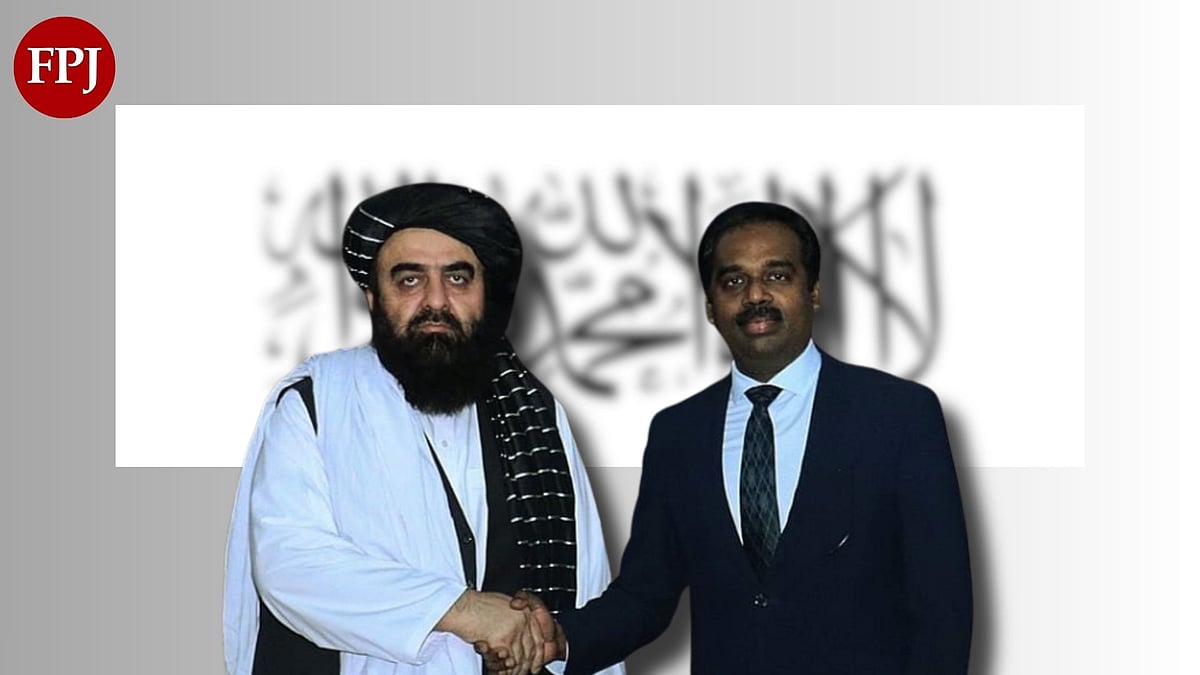Explained: Here's Why India Is In A 'Diplomatic Dilemma' Over Taliban Foreign Minister's Visit To New Delhi
India does not officially recognise the Taliban government, making the question of flag placement a sensitive issue that carries both symbolic and political weight. Indian officials are reportedly still deliberating how to handle the optics when S Jaishankar meets Amir Khan Muttaqi.

Explained: Here's Why India Is In A 'Diplomatic Dilemma' Over Taliban Foreign Minister's Visit To New Delhi | FPJ
New Delhi: Afghan Foreign Minister Amir Khan Muttaqi’s arrival in New Delhi has placed Indian diplomats in a complex protocol quandary. It is whether to display the Taliban flag alongside the Indian Tricolour during his scheduled meeting with External Affairs Minister S Jaishankar on Friday, October 10, or not.
India does not officially recognise the Taliban government, making the question of flag placement a sensitive issue that carries both symbolic and political weight.
Here's why India doesn't recognise the Taliban flag
Since the Taliban seized control of Kabul in 2021, India has refrained from granting official recognition to the regime, and the Afghan Embassy in New Delhi continues to fly the flag of the erstwhile Islamic Republic led by former President Ashraf Ghani. This has remained the diplomatic template so far. However, under standard protocol, visiting foreign ministers are typically greeted with their national flag displayed beside that of the host nation during formal meetings.
Indian officials, according to reports, are still deliberating how to handle the optics when Jaishankar meets Muttaqi. In previous encounters outside India, such as Foreign Secretary Vikram Misri’s meeting with Muttaqi in Dubai in January 2025, both sides avoided displaying any flags. Replicating that arrangement in New Delhi, however, is diplomatically more complicated, as it could be interpreted as either an implicit recognition or a deliberate snub.
Travel ban exemption
Muttaqi landed in New Delhi on October 9 after the United Nations Security Council (UNSC) temporarily lifted a travel ban on him under Resolution 1988 (2011). The UNSC Taliban Sanctions Committee, chaired by Pakistan, approved the exemption for his visit from October 9 to 16. He was received by Ministry of External Affairs spokesperson Randhir Jaiswal, who later wrote on X, “We look forward to engaging discussions with him on bilateral relations and regional issues.”
This marks the first ministerial-level visit from Kabul since the Taliban takeover. The agenda is expected to include discussions on trade, health cooperation, consular services, and upgrading diplomatic missions. Muttaqi is also likely to meet National Security Advisor Ajit Doval and interact with business groups and members of the Afghan diaspora in India.
Despite the lack of formal recognition, India has maintained limited engagement with the Taliban administration through a technical team in Kabul and humanitarian aid channels. Analysts view this as a pragmatic step to safeguard India’s interests amid shifting regional alignments and growing Taliban consolidation.
Balancing diplomatic strategy
The visit comes shortly after India joined the Taliban, Pakistan, China and Russia at the “Moscow Format” consultations, where participants opposed attempts by “countries to deploy their military infrastructure in Afghanistan and neighbouring states,” a statement, which is widely interpreted as criticism of US President Donald Trump’s proposal to regain control of the Bagram air base.
Experts say that the optics of Muttaqi’s visit are critical. Dr Mohammad Reyaz of Aliah University told LiveMint that “India has multiple strategic interests in Afghanistan that cannot be ignored — especially at a time when anti-Taliban factions are scattered and lack support from global powers.” Former diplomat Vivek Katju, quoted by The Hindu, argued that India should “await international consensus” before granting formal recognition to the Taliban regime.
For India, the challenge lies in balancing diplomatic protocol with political caution. Allowing the Taliban flag to stand beside the Indian Tricolour could be seen as a soft step toward recognition, while excluding it might be viewed as dismissive by Kabul. Either choice will be closely watched by regional powers assessing India’s role in post-2021 Afghanistan.
RECENT STORIES
-
-
-
-
-